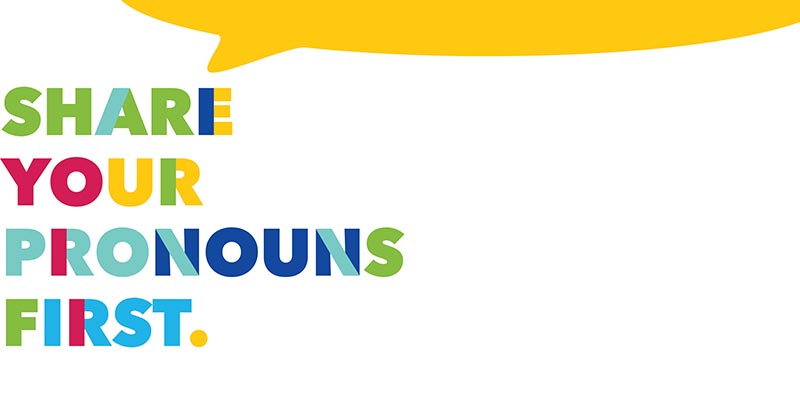Creating space: A collective journey toward a culture of inclusion
Author: UNB Newsroom
Posted on Jul 28, 2021
Category: UNB Saint John , UNB Fredericton

Members of the University of New Brunswick community have been working hard toward the implementation of the new Chosen Name and Gender Identity Policy.
Over the last few months, the Policy Working Group and Implementation Team have been busy preparing multiple educational tools and social media pieces designed to inform the UNB community about the various ways they can create and encourage a more positive and inclusive teaching, working and learning environment for everyone.
Last month, UNB held a special two-hour online version of the Positive Spaces workshop focused on the new policy. This updated workshop, which built upon previous positive spaces workshops, provided opportunities for faculty, staff and students to ask questions related to the policy. It also allowed facilitators to provide further education on how to best support members of the 2SLGBTQIA+ community by creating safer, more welcoming and barrier-free environments and services.
Caen Squires, communications officer for the Human Rights and Positive Environment Office of UNB, and upcoming graduate of UNB Fredericton’s MEd (adult education) program in the fall of 2021, has assisted in the creation and facilitation of UNB’s positive spaces workshops for the last four years. Squires is also one of the driving forces behind UNB’s upcoming awareness and inclusion campaign that focuses on the sensibilities of allyship, pronoun usage and gender identity recognition.
“I’ve found that folks are consistently afraid of doing or saying the wrong thing, and it’s that fear that halts them from even trying,” said Squires. “What I hope gets conveyed here is that we all have to start trying, even if it’s unfamiliar or sometimes uncomfortable.”
UNB’s awareness and inclusion campaign was heavily inspired by the work of Lee Airton, an assistant professor of gender and sexuality studies in education at Queen’s University, who created the No Big Deal campaign in 2016.
“I first came across the No Big Deal campaign when I was working with the 203 Centre for Gender and Sexual Diversity at UNB while looking for ways to begin conversations around pronouns,” says Squires. “As a trans non-binary student, and now an employee at UNB, I’ve experienced and understand some of the many challenges that people face in having their gender identity recognized both in the workplace and in classrooms.”
Airton’s personal experience of being an educator inspired them to develop the No Big Deal campaign.
“When the Canadian public suddenly became aware of gender pronouns in 2017 - due to the passage of Bill C-16 in the House of Commons - I was seeing many questions come up that weren’t being met with clear answers,” said Airton. “No Big Deal offers accessible answers to common questions, and provides a simple starting place: I’ll use your pronoun – no big deal!”
“The main crux of the No Big Deal campaign is to make space where people don’t actually have to know everything and can make mistakes,” they said. “By making the campaign available under a Creative Commons License, other institutions like UNB can build on this work.”
Airton adds that while the impact of the original campaign has been hard to gauge, they are starting to see subtle change in how trans peoples’ pronouns are used and discussed in the media and across institutions – increasingly, as ‘no big deal.’ However, they note that barriers remain.
“A real barrier is the negotiation of campus services and information systems,” said Airton. “Many transgender students have trouble accessing services, are not able to receive appropriate accommodations and they’re often misgendered in class.”
“These interactions can be very alienating. It’s important that everyone recognizes that they play a very important role in all of this, which begins with using someone’s correct pronouns once you know what they are, making a mistake – a quick and neutral sorry-rephrase-move-on – and saying ‘they’ until you know.”
Squires says that UNB’s new policy supports the UNB community in shifting the narrative from one of exclusion to inclusion.
“As we move forward, we need to be willing, as Dr. Airton recently told me, to make better mistakes,” they said. “Just try, and keep trying, even if you make mistakes. Learn from them. Those efforts count and can make real differences in the lives of people. It isn’t always easy or comfortable, but if we actively recognize and promote a collective intention to do better, to be better, and if we acknowledge the efforts folks make, together we can create an empowering space for allyship and inspire change.”
“As an institution, it’s our job to make sure that our people land harm free,” they add. “All in all, we need vulnerability and transparency to identify existing gaps in order to help our community members navigate the obstacles around them and create bridge points that will allow them not only to succeed, but also thrive.”
For more information on the policy or on our on-going efforts regarding awareness raising and implementation, contact the Human Rights and Positive Environment Office, humanrights@unb.ca.
Media contact: Angie Deveau
